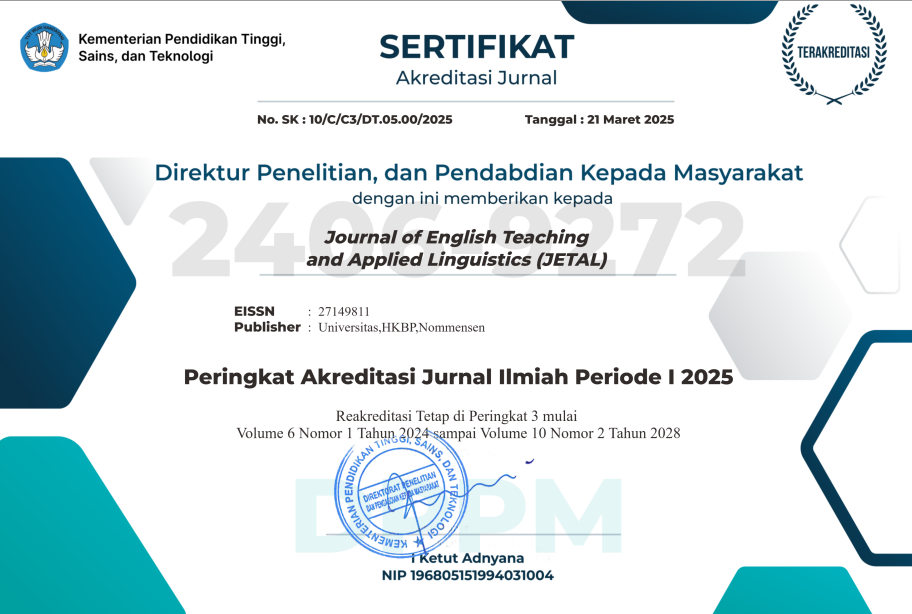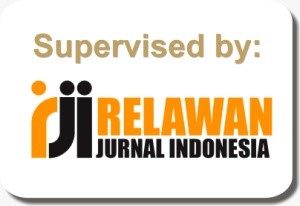THE EFFECTIVENESS OF ARTIFICIAL INTELLIGENCE BY CHATBOT IN ENHANCING THE STUDENTS’ VOCABULARY
Abstract
This research aims to find out the effectiveness of artificial intelligence (AI) by chatbot in enhancing the vocabulary students at FKIP Universitas HKBP Nommensen Pematangsiantar. The focus of the research is on the vocabulary skill in teaching English. This research uses the qualitative research methods and used interview and documentation from the students. There are 30 students for the subject of the research out of 70 students in English Vocabulary class of the first semester in English department of Universitas HKBP Nommensen Pematangsiantar. The results of the research are the artificial intelligence application through chat bot enhance the students’ vocabulary in learning English. The students feel enjoy, fun, easy to learn the English words. It can be applied in writing notes diary, essay paragraph in English. The researcher suggests the user of English such as lectures, teachers to use AI chatbot in the classroom instruction because it can be more effective for the students to get the meaning of the words in English. Hopefully the next reseacher can develop the research for more varying language proficiency. The result is that the artificial intelligence affect to the effectiveness in enhancing English vocabulary of the university students. It shows that all participants are enthusiastic, happy, and motivated because this application is still unfamiliar to participants. Participants also know the use of this application, so they can indirectly learn independently whenever and wherever participants
References
Arikunto, S. (2010). Prosedur Penelitian: Suatu Pendekatan Praktik. Jakarta: PT Rineka Cipta.
Alsadoon, R. (2021). Chatting with AI Bot: Vocabulary Learning Assistant for Saudi EFL Learners. English Language Teaching, 14(6), 135. https://doi.org/10.5539/elt.v14n6p135
Al-Amri, Z. (2019). Athr astkhdam rwbwt drdshh lldka' alastna'ey ltnmyh aljwanb alm'erfyh fy madh al'elwm lda talbat fy almrhlh alabtda'eyh [The effect of using AI Chatbot for developing cognitive aspects in the science course for elementary grade female students]. Saudi Educational & Psychology Association, (64), 23–48.
Batubara, S., Maharani, F., & Mukhrani. (2022). Pengembangan Usaha Umkm Dimasa Pandemi. 02(01), 1017–1022.
Essel, H. B., Vlachopoulos, D., Tachie-Menson, A., Johnson, E. E., & Baah, P. K. (2022). The impact of a virtual teaching assistant (Chatbot) on students’ learning in Ghanaian higher education. International Journal of Educational Technology in Higher Education, 19, Article 57. https://doi.org/10.1186/s41239-022-00362-6
Monova-Zheleva, M. (2005). Adaptive learning in web-based educational environments. Cybernetics and Information Technologies, 5(1), 44–55. https://cit.iict.bas.bg/CIT_05/v5-1/44-55.pdf
Muhammad, A. F., & Adila, F. (2021). Pengembangan Chatbot Percakapan Bahasa Inggris Menggunakan Dialogflow. JIPI (Jurnal Ilmiah Penelitian Dan Pembelajaran Informatika), 6(1), 25–37. https://doi.org/10.29100/jipi.v6i1.1821
Magerira, K., Pittou, D., Papasalouros, A., Kotis, K., Zangogianni, P., Daradoumis, A., (2022). Educational AI Chatbots for Content and Language Integrated Learning. Applied Science, 12(7), 1–16.https://doi.org/10.3390/app12073239
Humstein, D., & Hundertmark, S. (2017). Chatbots-An Interactive Technology for Personalized Communication, Transactions and Services. IADIS International Journal on WWW/Internet,15(1), 96–109. https://www.researchgate.net/publication/322855718
Kuhail, M. A., Alturki, N., Alramlawi, S., & Alhejori, K. (2023). Interacting with educational chatbots: A systematic review. Education and Information Technologies, 28(1), 973–1018. https://doi.org/10.1007/s10639-022-11177-3
Kim, N. Y., Cha, Y., & Kim, H. S. (2019). Future English learning: Chatbots and Artificial Intelligence. Multimedia-Assisted Language Learning, 22(3), 32–53.
Kim, N. Y., Cha, Y., & Kim, H. S. (2021). Effects of AI Chatbots on EFL Students’ Communication Skills. Korean Journal of English Language and Linguistics, 21, 712– 734.https://doi:10.15738/kjell.21..202108.712
Klimova, B., & Seraj, P.M.I. (2023). The use of chatbots in university EFL settings: Research trends and pedagogical implications. Front. Psychol., 14 (1146), 1–7. https://doi.org/10.3389/fpsyg.2023.1131506
Kumar, J. (2021). Educational Chatbots for Project-Based Learning: Investigating Learning Outcomes for a Team-based Design Course. International Journal of Educational Technology in Higher Education, 18(1), 1–28
Lei, X., Fathi, J., Noorbakhsh, S., & Rahimi, M. (2022). The Impact of Mobile-Assisted Language Learning on English as a Foreign Language Learners’ Vocabulary Learning Attitudes and Self-Regulatory Capacity. Frontiers in Psychology, 21 (13), 872922.https://doi:10.3389/fpsyg.2022.872922
Sugiyono. (2010). Metode Penelitian Kuantitatif dan Kualitatif dengan R & D. Bandung: Alfabeta.
Moleong, L. J. (2009). Metodology Penelitian Kualitatif. Bandung: Remaja Rosdakarya.
Mohammed, M. H. (2018). Challenges of learning English as a foreign language (EFL) by non-native learners. International Journal of Social Science and Economic Research, 03(04), 1381–1400. www.ijsser.org Muhammad, A. F., & Adila, F. (2021). Pengembangan Chatbot Percakapan Bahasa Inggris Menggunakan Dialogflow. JIPI (Jurnal Ilmiah Penelitian Dan Pembelajaran Informatika), 6(1), 25–37. https://doi.org/10.29100/jipi.v6i1.1821 Sari, T., & Nayır, F. (2020). Challenges in distance education during the (Covid-19) pandemic period. Qualitative Research in Education, 9(3), 328–360. https://doi.org/10.17583/qre.2020.5872
Vijayalaksmi, M. (2021). ICT In 21st century Teaching and Learning. 21st Century Education: Techno-Pedagogical Trends and Innovations, March, 2–13. https://www.researchgate.net/publication/349713146
Vázquez-Cano, E., Mengual-Andrés, S., & López-Meneses, E. (2021). Chatbot to improve learning punctuation in Spanish and to enhance open and flexible learning environments. International Journal of Educational Technology in Higher Education, 18(1), 18-33. https://doi.org/10.1186/s41239-021-00269-8

This work is licensed under a Creative Commons Attribution-ShareAlike 4.0 International License.
Authors retain copyright and grant the journal right of first publication with the work simultaneously licensed under a Creative Commons Attribution-ShareAlike 4.0 International License (CC BY-SA 4.0) that allows others to share the work with an acknowledgment of the work's authorship and initial publication in this journal.
Authors are able to enter into separate, additional contractual arrangements for the non-exclusive distribution of the journal's published version of the work (e.g., post it to an institutional repository or publish it in a book), with an acknowledgment of its initial publication in this journal.
Authors are permitted and encouraged to post their work online (e.g., in institutional repositories or on their website) prior to and during the submission process, as it can lead to productive exchanges, as well as earlier and greater citation of published work (See The Effect of Open Access).






